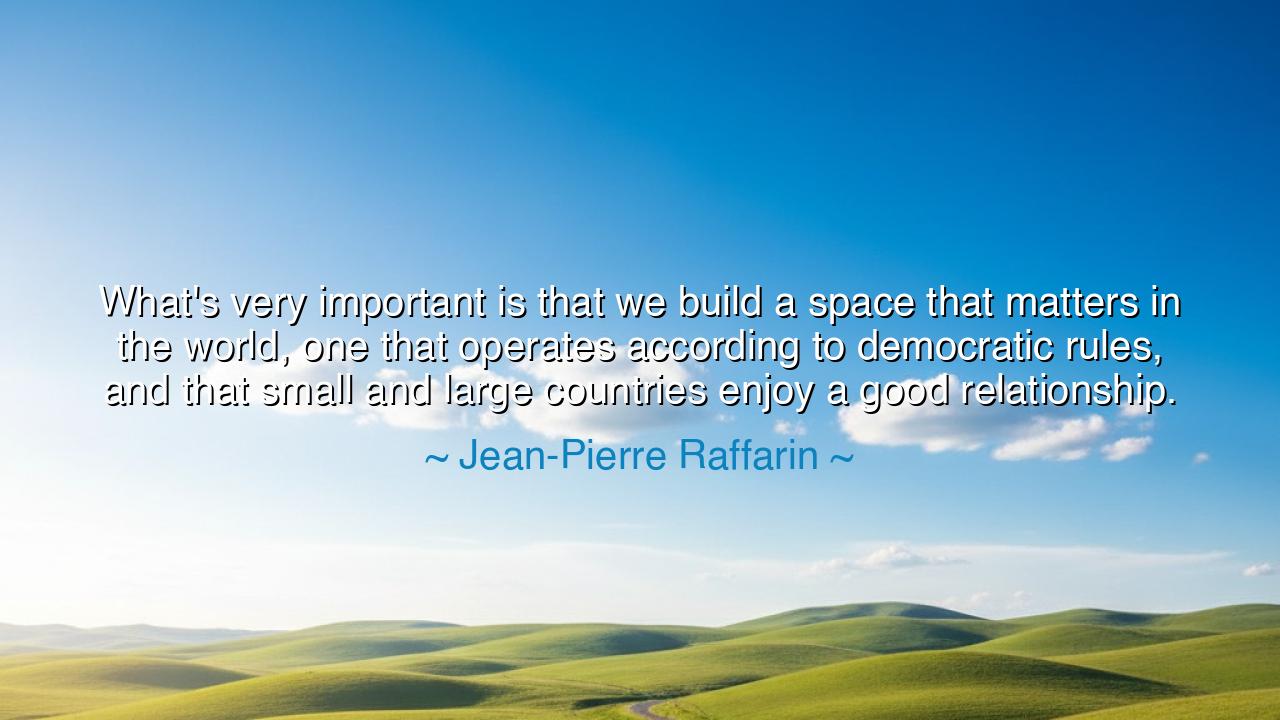
What's very important is that we build a space that matters in
What's very important is that we build a space that matters in the world, one that operates according to democratic rules, and that small and large countries enjoy a good relationship.






The statesman Jean-Pierre Raffarin once declared with vision: “What’s very important is that we build a space that matters in the world, one that operates according to democratic rules, and that small and large countries enjoy a good relationship.” In these words he summons us to the ancient labor of nations—to forge not merely alliances of convenience, but a space of meaning, justice, and harmony among peoples. Such a space is not a place of walls and boundaries, but of order, fairness, and dignity.
For the foundation of this space must be democratic rules, where the strong do not trample the weak, and where each voice is given weight. Without such rules, power becomes tyranny, and peace becomes an illusion. Democracy is the discipline that tempers ambition, the law that allows many to live together as one. To forsake it is to invite chaos, but to embrace it is to create a sphere where trust may grow between nations.
Raffarin speaks also of the bond between small and large countries. In the order of the world, power is unevenly shared, yet justice demands that might not dictate worth. A good relationship between the mighty and the humble is the mark of a true civilization. For when the great honor the small, they gain legitimacy; when the small honor the great, they gain partnership. Together, they weave a fabric of strength greater than any single thread.
The ancients knew this truth well. Empires that ignored justice and crushed the weak sowed the seeds of their own destruction. But those who sought balance, who honored treaties, who gave space for all peoples to flourish, endured beyond generations. The call to build such a space that matters is therefore not merely political but deeply moral, echoing the timeless demand for harmony among men.
So let this wisdom endure: the world must be shaped not only by power, but by relationship; not only by wealth, but by fairness. If we are to build a space that matters, let it be one where the voices of both small and great resound together, bound by democratic rules and guided by mutual respect. Only then will the labor of nations bear fruit that is worthy of the human spirit.






TTThao Pham Thi Thu
This quote makes me reflect on the importance of democracy, not only within countries but also in global relationships. By highlighting the need for good relationships between nations of all sizes, Raffarin touches on the complexity of international diplomacy. How do we ensure that democratic principles guide our relationships with smaller countries, and how do we prevent them from being sidelined by the more powerful players on the world stage?
QBTRAN QUOC BAO
Raffarin’s quote speaks to the need for a fair and democratic global order, where all countries, regardless of size, can enjoy positive relationships. I wonder, though, how realistic is it for small countries to have an equal influence in a world dominated by large, powerful nations? Can a truly democratic international system be achieved, or will the interests of larger countries always outweigh those of smaller ones?
DNKhanh Duong Nguyen
This quote brings to mind the challenges of maintaining diplomatic relations between countries of varying power. It’s easy for larger nations to dominate the conversation, but Raffarin’s point about building spaces where both small and large countries can thrive under democratic principles is important. What are the practical steps we can take to ensure that international relationships are truly balanced, rather than being shaped by power dynamics?
GDGold D.dragon
Jean-Pierre Raffarin's quote emphasizes the importance of creating spaces where both small and large countries can cooperate under democratic principles. It makes me think about how global relationships often seem dominated by the interests of more powerful nations. How can we foster true equality on the global stage, where every country, regardless of size, has a fair voice? Is it possible to balance democratic values with geopolitical realities?